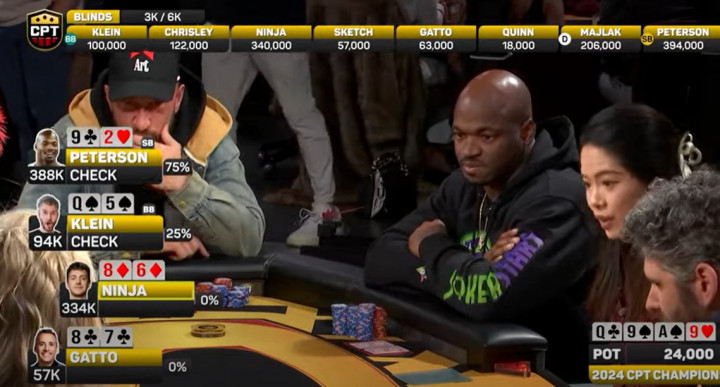News/Commentary
- Bears rally past Chiefs, and Cowboys avoid going winless as NFL wraps up 2025 preseason
- Iowa State upsets Kansas State, Hawaii Walks-off win over Stanford
- MLB: Red Sox go up 2-games-0 at Yankees; Padres take game 1 over Dodgers
- College Football Legends at the Casino Tables
- MLB: Red Sox and Yankees renew their rivalry
- NFL: The last preseason weekend is underway
- From Freshmen to Legends: College Football Stars Who Changed the Game
College Football Legends at the Casino Tables
August 22, 2025 by Staff

Adrian Peterson at a Celebrity Poker Tour event (Source: uncredited)
At first glance, the worlds of college football and casino gambling would have little in common. And, admittedly, generally speaking, they don’t. Yet, over the years, they have been connected in ways that are still surprising and intriguing.
Many football legends, long after their playing days at college were over, still found themselves attracted to the bright flashing lights of a casino floor where “action” plays out in chips and cards rather than in yards and touchdowns. Less about chance, it relates instead to qualities both fields demand: quick thinking, composure under immense pressure, and love for competition.
College Legends and Their Casino Stories
From football stadiums to gaming tables, some of the most famous names in the game have made the transition from one form of excitement to another. The social, strategic, and at times even a tad reflective form of casino experience is yet another great stage for big moment performers.
It can be a rowdy cheer at a craps table, silence at poker, or perhaps time away from the crowd with an online slots pace for someone’s kind of gaming flow. Tom Brady has been featured in some high-stakes poker shows and brings to the table that same measured approach.
Recently, Peyton Manning shared a little good-natured but competitive poker session with his brother Eli. And the other night, football figures enjoyed the gaming world, their sensibilities and characters suited to the mental demands of the table. The shift from a playbook to a poker hand is less a leap than it seems: both require reading opponents, forecasting outcomes, and managing the moment.
The NCAA’s Hard Line on Betting
However, for current players, the relationship between sports and gambling is far more restricted. NCAA rules strictly prohibit student-athletes and staff from betting on NCAA-sanctioned games.
This is in the interest of the game's integrity and public trust. Today, schools use advanced monitoring systems to scan for suspicious betting patterns, which suggests how seriously they are following the rules.
For a college athlete, even casual references to gambling can carry great meaning. While retired stars are free to join a blackjack table or a poker tournament, if an active player participates in gaming that relates to collegiate sports, there will be tremendous scrutiny. This is what sets up the clear divide, in large part, the culture of casino gaming is a post-college pursuit for those who once shone under the Saturday lights.
Football Stars at the Tables After College
Once they are through with their careers and no longer on the NCAA roster, the poker room welcomes many former athletes looking for a new challenge. Some fall in love with poker for its marriage of skill and psychological warfare. Some fall in love with blackjack because of its swift decisions, while some fall in love with roulette because of its unpredictability, and others with baccarat because of its beauty.
The attraction is generally not just about the games themselves. Casinos are places with much socializing where people converse as much as cards would allow former athletes, it allows competition without the rigorous physical demands of their sport. The mental intensity of it, doing the right thing at the right time, often harks back to moments from their playing days, albeit in a different arena.
Why the Casino Appeals to the Football Mindset
Striking is the overlap between football skills and gaming instincts. On the field, players are keyed up to so many situations as they adjust to shifting strategies of play and what the opponent might do next.
These very same traits come into play at the poker table or in blackjack. A defensive back reading a quarterback’s eyes is not far from a poker player reading a tell.Casinos provide a balance between anonymity and recognition.
A football name might catch the eye at first, but inside of a game, all attention turns to skill. For quite a few, it's just a way to keep measuring themselves, no play clock, no stadium noise, just the steady beat of the game.
In the end
College football stars at the casino tables illustrate how competitive zeal all too frequently seeks a fresh outlet when the roar of the stadium is distant. The shift from playbook to poker chip is more one of adjustment than of change of identity.
Whether closeted at a quiet table determined on the next hand or sharing a guffaw over blackjack, the experience fills out already career stories with additional pages. The sport may have changed, but for others, the drive to compete remains as fierce as ever.